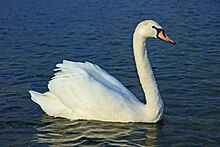hattyú
Hello, you have come here looking for the meaning of the word hattyú. In DICTIOUS you will not only get to know all the dictionary meanings for the word hattyú, but we will also tell you about its etymology, its characteristics and you will know how to say hattyú in singular and plural. Everything you need to know about the word hattyú you have here. The definition of the word hattyú will help you to be more precise and correct when speaking or writing your texts. Knowing the definition ofhattyú, as well as those of other words, enriches your vocabulary and provides you with more and better linguistic resources.

hattyú
Hungarian

Etymology
From Proto-Ugric *kottɜŋɜ (“swan”), from Proto-Turkic *kugu (“swan”).[1][2] See kuğu.
Pronunciation
Noun
hattyú (plural hattyúk)
- swan (any of various species of large, long-necked waterfowl, of genus Cygnus, most of which have white plumage)
Declension
| Inflection (stem in long/high vowel, back harmony) | ||
|---|---|---|
| singular | plural | |
| nominative | hattyú | hattyúk |
| accusative | hattyút | hattyúkat |
| dative | hattyúnak | hattyúknak |
| instrumental | hattyúval | hattyúkkal |
| causal-final | hattyúért | hattyúkért |
| translative | hattyúvá | hattyúkká |
| terminative | hattyúig | hattyúkig |
| essive-formal | hattyúként | hattyúkként |
| essive-modal | — | — |
| inessive | hattyúban | hattyúkban |
| superessive | hattyún | hattyúkon |
| adessive | hattyúnál | hattyúknál |
| illative | hattyúba | hattyúkba |
| sublative | hattyúra | hattyúkra |
| allative | hattyúhoz | hattyúkhoz |
| elative | hattyúból | hattyúkból |
| delative | hattyúról | hattyúkról |
| ablative | hattyútól | hattyúktól |
| non-attributive possessive - singular |
hattyúé | hattyúké |
| non-attributive possessive - plural |
hattyúéi | hattyúkéi |
| Possessive forms of hattyú | ||
|---|---|---|
| possessor | single possession | multiple possessions |
| 1st person sing. | hattyúm | hattyúim |
| 2nd person sing. | hattyúd | hattyúid |
| 3rd person sing. | hattyúja | hattyúi |
| 1st person plural | hattyúnk | hattyúink |
| 2nd person plural | hattyútok | hattyúitok |
| 3rd person plural | hattyújuk | hattyúik |
Derived terms
Compound words
Expressions
References
- ^ Entry #1777 in Uralonet, online Uralic etymological database of the Hungarian Research Centre for Linguistics.
- ^ hattyú in Zaicz, Gábor (ed.). Etimológiai szótár: Magyar szavak és toldalékok eredete (‘Dictionary of Etymology: The origin of Hungarian words and affixes’). Budapest: Tinta Könyvkiadó, 2006, →ISBN. (See also its 2nd edition.)
Further reading
- hattyú in Bárczi, Géza and László Országh. A magyar nyelv értelmező szótára (“The Explanatory Dictionary of the Hungarian Language”, abbr.: ÉrtSz.). Budapest: Akadémiai Kiadó, 1959–1962. Fifth ed., 1992: →ISBN
